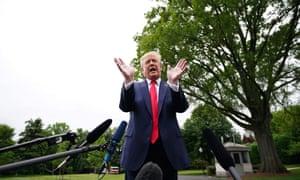The Open Skies Treaty allows Russia and western nations to conduct observation flights

Photograph: Mandel Ngan/AFP/Getty Images
The US has declared its intention to leave the Open Skies Treaty, which is intended to reduce the risk of war by allowing Russia and western nations to conduct observation flights over each other’s territory.
Washington informed the other 33 parties to the treaty of its intention to deliver a formal six-month notice of withdrawal on Friday, accusing Russia of violations.
“I think we have a very good relationship with Russia, but Russia didn’t adhere to the treaty, and so until they adhere to the treaty, we will pull out,” Donald Trump told reporters. He added: “There’s a very good chance we’ll make a new agreement or do something to put that agreement back together.”
In a written statement, the secretary of state Mike Pompeo said the US could reconsider its withdrawal during the six month notice period “should Russia return to full compliance with the Treaty”. Moscow denies being in violation of the agreement.
America’s European allies are keen to keep the treaty going. They have benefited from the more than 1,500 overflights carried out under the OST, allowing them to observe Russian military movements, and see it as a remaining element of international cohesion and transparency.
“The writing has been on the wall for a long time,” a European diplomat said, adding it was “still disappointing”.
The OST is the third arms control agreement Trump has left. He took the US out of the Iran nuclear deal in 2018, and the Intermediate-range Nuclear Forces treaty in 2019. There are fears for the future of the last treaty limiting US and Russian strategic nuclear weapons, New Start, which is due to expire in February next year, and the Comprehensive Test Ban Treaty, which the US has signed (observing a voluntary moratorium on nuclear tests) but not ratified.
It is unclear how Russia will respond to US withdrawal. They will now be able to fly over US bases in Europe but the US will no longer be allowed to overfly Russia.
Under the 2020 defence spending act, the administration is supposed to explain to Congress how leaving OST serves US security interests and give assurances that Washington has consulted its partners, 120 days before serving formal notice of withdrawal.
“Reckless deal wrecking and the collapse of US leadership continues,” Kingston Rief, director for disarmament and threat reduction policy at the Arms Control Association said.
“The treaty benefits US and European security. Our allies value it and don’t want us to leave. It has been an important tool for responding to Russia’s aggression against Ukraine. This is a propaganda coup for Moscow.”
The US has complained about curbs that Moscow has imposed on overflights that have violated the accord. Russia limited the flight time of observation flights over the Russian enclave of Kaliningrad and set up an exclusion corridor along the border of the Russian-occupied regions of Georgia, South Ossetia and Abkhazia.
“Realize the Russians were cheating,” Tim Morrison, who was briefly the top arms control official in the Trump White House, said on Twitter. “They were misusing the treaty against the US – as senior military and civilian leaders warned. Withdrawing denies Putin a collection tool – this is not a win for him.”
Russia’s foreign ministry rejected allegations of infringements as “groundless” on Thursday and said Moscow had an “alternate plan” in the event of US withdrawal, but did not provide details.
None of the other parties believed that the Russian infringements were enough to jeopardise the treaty.
US partners were informed of the decision on Thursday with calls from the national security adviser, Robert O’Brien, the defence secretary, Mark Esper and the Pentagon’s acting undersecretary for policy, James Anderson.
“This is insane,” was the immediate tweeted reaction from Michael Hayden, a former CIA director.
In a joint statement earlier this month, a group of 16 retired military commanders and defence ministers said: “Throughout its operation, the treaty has increased military transparency and predictability, helped build trust and confidence, and enhanced mutual understanding.”



